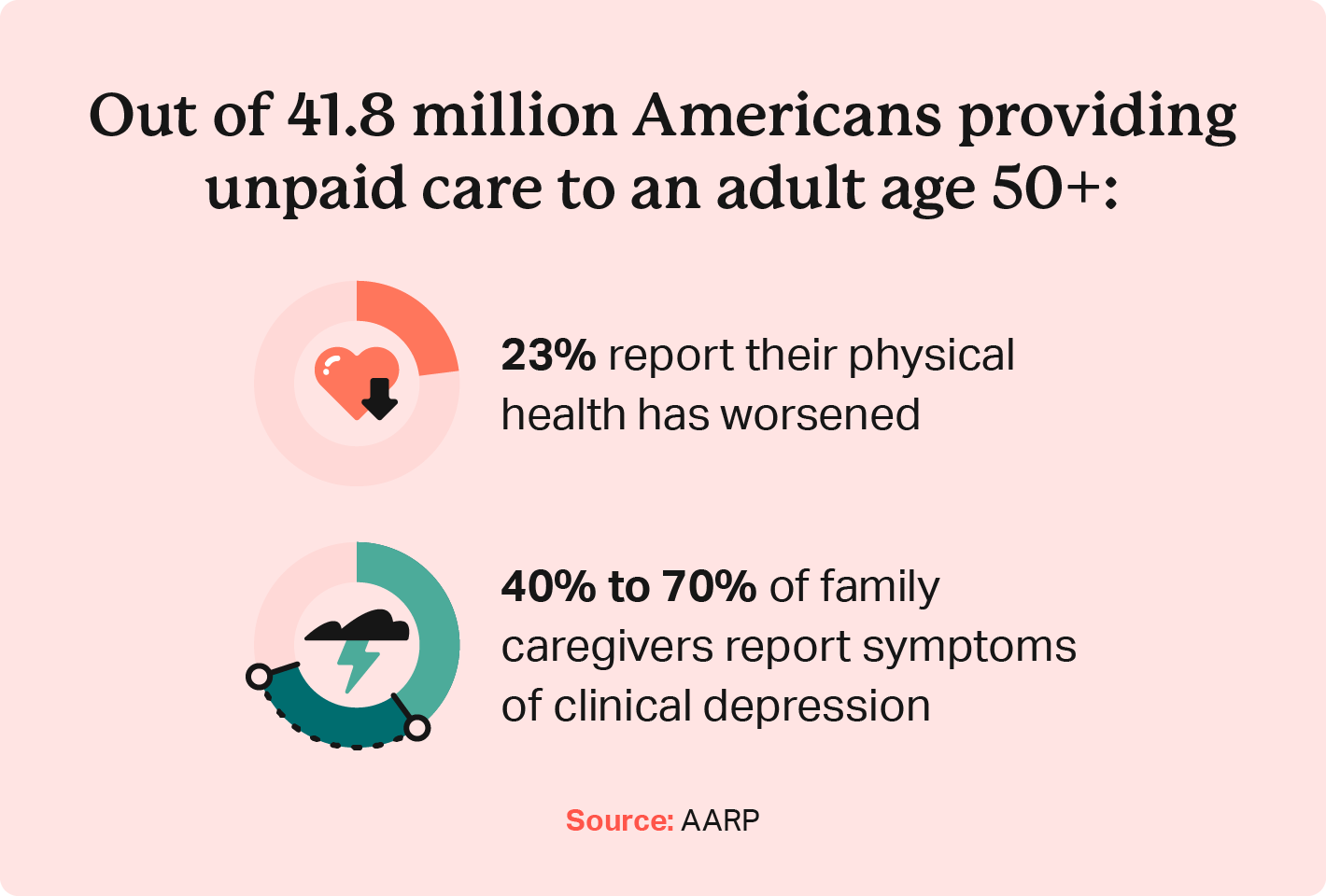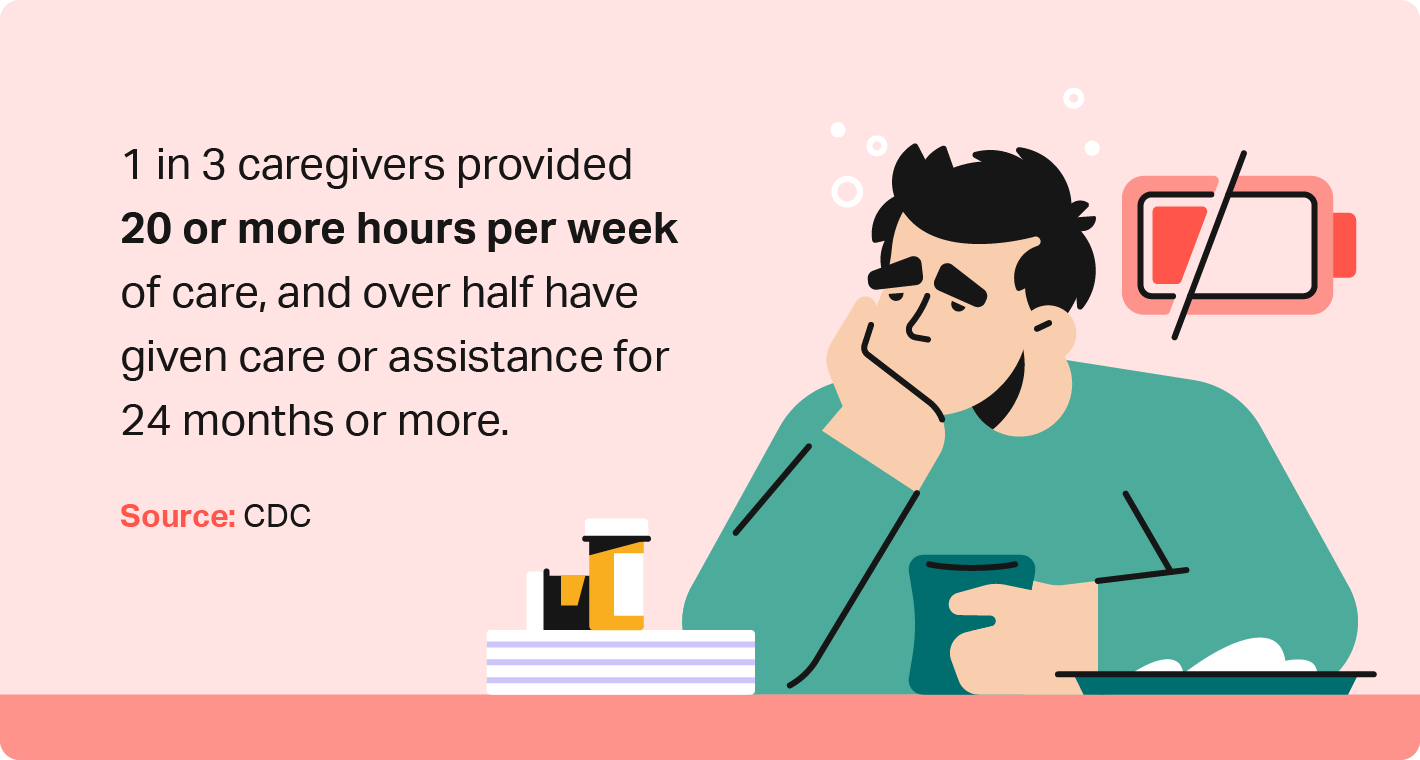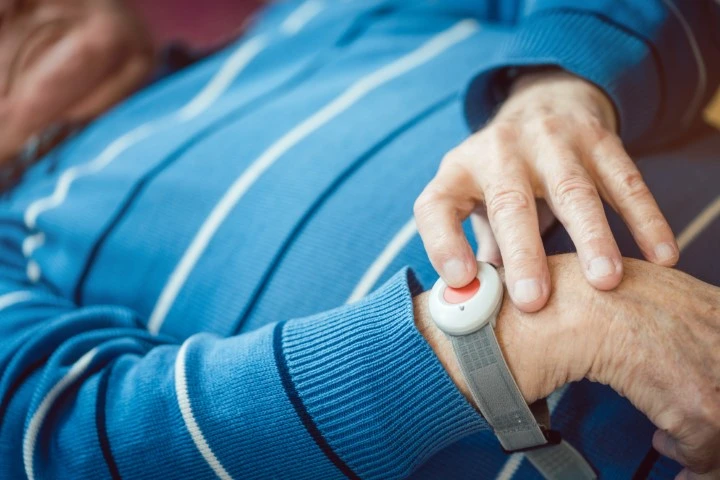When a senior needs reliable care, it often comes from trusted children, family members, and close friends. While caring for a loved one is rewarding, serving as a caregiver, especially someone’s primary caregiver, is a demanding job that has just as many challenges as it does gifts. If steps are not taken to reduce stress, it may eventually escalate to the point of caregiver burnout.
Caregiver burnout can have a tremendous impact on one’s personal and even professional life. Preventing burnout means recognizing the symptoms and learning new ways to manage mounting stress.
What Is Caregiver Burnout?
Caregiver burnout occurs when a caretaker has reached a point of complete physical, emotional, and mental exhaustion due to unrelieved stress. In addition to chronic fatigue and feelings of hopelessness, caregiver burnout may be accompanied by depression and severe mood swings — someone may go from caring and patient to distant and irritable in a matter of minutes. Nearly a quarter of caregivers also reported consequences to their physical health as a result of prolonged stress.
Causes
While the demanding nature of caring for a senior and the frustration that can accompany the role are the most obvious stressors for caregivers, they aren’t the only causes of burnout.
Other factors may include:
- Refusal of aid: Some caregivers deny they need help or refuse to ask for aid, even when they’re obviously overwhelmed.
- Emotional demands: Watching a loved one’s health deteriorate is never easy, and being a primary caretaker can place an overwhelming amount of stress and guilt on anyone — even when they’ve done everything right.
- Unrealistic expectations: When a loved one’s well-being is their responsibility, many caregivers believe they can handle more than they actually can or have unrealistic expectations about the impact they will have on the senior in their care.
- Conflicting roles: Many caregivers find it difficult to establish boundaries between their responsibilities as a caretaker and those of their personal and professional lives.
- Lack of personal care: Caretakers often don’t have a lot of time to themselves, so physical and mental self-care typically fall by the wayside.
- Workload: On top of their responsibilities as a caregiver, people still need to carry out their own personal tasks and chores. For many, there’s just too much to do.
Who is most likely to experience caregiver burnout?
Any caregiver can experience burnout, but external pressures like finances, work, and family roles can make some more vulnerable to stress. You may be more prone to stress or fatigue if you’re:
- Caring for an aging, sick, or disabled spouse
- Caring for someone with dementia
- Juggling work responsibilities and caretaking
- Under financial pressure
- Caring for an aging adult while also raising a child — sometimes referred to as sandwich generation caregivers
Symptoms
High levels of stress associated with senior care is usually the first indication of burnout. While experiencing stress in a caregiver role is absolutely normal, prolonged feelings of hopelessness and fatigue are not. Here are some other signs of caregiver burnout to make note of:
| Short-term symptoms | Long-term symptoms |
|---|---|
| Frequent illness, headaches, stomachaches, or body pain | High blood pressure |
| Increase or decrease in appetite | Heart problems |
| Lack of interest in previous interests | Clinical depression |
| Withdrawal from friends and loved ones | Weakened immune system |
| Suicidal feelings | Elevated risk of developing chronic diseases such as diabetes or cancer |
| A lack of caring for personal well-being | PTSD |
| Emotional exhaustion and inability to relax, even when not acting as a caregiver | Anxiety disorders |
| Thoughts of harming the person in one’s care | Compassion fatigue |
If you believe you’re experiencing caregiver burnout, it’s essential you take steps now to reverse it. Prolonged caregiver fatigue can have serious consequences for your health and well-being. If you can’t manage your stress, you may reach a point at which you are no longer able or willing to effectively perform as a caregiver.
How do you diagnose caregiver burnout?
Caregiver burnout can be diagnosed by a doctor or mental health provider. Before giving a diagnosis, your doctor will evaluate your physical and mental state — they’ll want to know how well you’re taking care of yourself and how caregiver stress is impacting your daily life.
They may also test you for depression and/or anxiety if they feel they could be possible symptoms of caregiver burnout. If you’re experiencing fatigue or other burnout symptoms, talk to your doctor or medical professional to discuss treatment options.
Caregiver burnout vs. compassion fatigue
Compassion fatigue is often a symptom of caregiver burnout, but they differ in origin. While caregiver burnout is often caused by overbearing responsibilities and stress, compassion fatigue is a secondary stress disorder that stems from constant exposure to trauma.
Compassion fatigue is described as a lack of empathy resulting from taking on the emotions of those in your care. Signs of compassion fatigue include:
- Difficulty sleeping
- Difficulty being present
- Withdrawal
- Heightened irritability
- Mood swings
- Feelings of hopelessness
- Anxiety
- Headaches, stomachaches, and body aches
Caregiver burnout vs. depression
The symptoms of burnout and depression are similar, but these are separate conditions with their own causes and treatments. Burnout is typically the result of severe stress caused by external sources, while depression is considered a mood disorder.
That said, if you’re removed from the stressful environment that caused your burnout, your symptoms will improve with time. If they don’t, you may be suffering from depression and may require medication or psychotherapy.
How To Prevent Burnout And Stress
The road to caregiver burnout doesn’t need to end with quitting your role. There are numerous steps you can take to avoid and treat it. If you find yourself overburdened with your caretaker responsibilities, here are a few tips to help manage your stress:
- Pinpoint sources of stress: Caretaking is a huge undertaking, and oftentimes it can be difficult to really understand where your stress is coming from. Talking to a friend, therapist, or even a coworker who’s removed from the situation can help you see things from a different perspective — you may even realize some of your major stressors are completely normal and nothing to feel guilty about.
- Focus on physical health: A well-balanced diet, regular exercise, and getting plenty of rest can do wonders for your physical and mental health.
- Find time for self-care: When you make an effort to prioritize your own mental, emotional, and physical well-being, you’ll be more attentive and present in all your relationships — not just the one you have with your care receiver. Spending time outdoors, enjoying music, or even playing with a pet can help alleviate daily stress levels.
- Ask for help: No one expects you to do it all on your own. When you’re beginning to feel overwhelmed, ask a friend or family member for help on a specific task, like meal prepping or picking the kids up from school. Respite networks are also available to provide support.
- Maintain your relationships: Contact with friends or family is important to avoid feeling overwhelmed and disconnected from the world beyond life as a caregiver. In addition to interacting with friends, mapping your support groups and social workers can provide outlets to talk about things that are frustrating or causing stress.
- Seek occupational therapy: Occupational therapists work with injured, ill, or disabled people on learning or relearning skills that promote independence. However, they can also support caregivers by helping them develop the skills to find a balance between their caregiver role and their daily life.
- Take advantage of caregiver resources: Many nonprofit organizations offer respite care, crisis, transportation, training and education, and meal services to help prevent caretaker burnout. Ask your local senior center to see what’s offered in your area, or browse our resources below.
Caregiver Resources
- LGBTQ Senior Resources: Use this list to discover resources for LGBTQ seniors that offer community, health care knowledge, housing assistance, and more.
- Eldercare Locator: resources for those who need assistance with state and local area agencies on aging and community-based organizations that serve older adults and their caregivers
- Family Caregiver Alliance: information, support, and resources for caregiving and long-term care issues for family caregivers throughout the country
- Caregiver Action Network: resources, including a peer forum, a story-sharing platform, and a family caregiver toolbox to support family caregivers and rare disease caregivers
- National Family Caregiver Support Program: provides grants to states and territories to fund a range of support services that assist family and informal caregivers
- Cancer Support Community Affiliates & Support Groups for Caregivers: worldwide professional programs designed to assist informal caregivers for someone with cancer
- Help for Cancer Caregivers: guides to create a caregiver personal care guide to manage stress and prevent burnout
- Alzheimer’s Association: support, training, and resources for those caring for someone with Alzheimer’s and other dementias
Frequently Asked Questions
Yes, you can get post-traumatic stress disorder (PTSD) from being a caregiver. The role isn’t just physically exhausting, but mentally, emotionally, and financially draining as well. Adult children caring for aging parents with dementia or severe disability are especially at risk of developing PTSD because many of them feel powerless to stop the conditions from worsening.
If you begin to experience any of the symptoms of caregiver burnout, you may need to take a step back from the role to refocus your energy on yourself. However, if you’ve become completely preoccupied with the emotions and needs of your care receiver or you find yourself resenting them, it may be time to seek a permanent alternative.
Care for Yourself While Caring for Others
Caring for a loved one is one of the most selfless acts of kindness you can do, but it’s not without its challenges. When you find yourself struggling to juggle dinner, work reports, kids, and caretaking duty, caregiver burnout can quickly take hold.
It may be easier said than done, but finding the time to focus on your own physical and mental health is essential to preventing this debilitating condition — and your family, friends, and care receiver will thank you for it.
While making sure your loved ones are comfortable physically, Choice Mutual can help alleviate financial concerns. Get in touch to compare final expense life insurance quotes so you can find a plan that’s right for you and your loved one.
Sources:
- AARP and National Alliance for Caregiving. Caregiving in the United States 2020. AARP. 2020.
- Gérain P, Zech E. Do informal caregivers experience more burnout? A meta-analytic study. Psychology, Health & Medicine. 2020.
- American Medical Association. Caring for the caregiver: A guide for physicians. AMA. 2018.
- Family Caregiver Alliance. Caregiving and Depression. Family Caregiver Alliance. 2016.
Choice Mutual often cites third-party websites to provide context and verification for specific claims made in our work. We only link to authoritative websites that are known to provide accurate information. You can learn more about our editorial standards, which guides our mission of delivering factual and impartial content.
- consequences to their physical health. https://www.aarp.org/ppi/info-2020/caregiving-in-the-united-states.html
- someone with dementia. https://www.alz.org/norcal/helping_you/support_groups
- sandwich generation caregivers. https://mhanational.org/caregiving-and-sandwich-generation
- Respite networks. https://archrespite.org/
- mapping your support groups. https://atlasofcaregiving.com/caremap/
- Eldercare Locator. https://eldercare.acl.gov/Public/Resources/Topic/Caregiver.aspx
- Family Caregiver Alliance. https://www.caregiver.org/
- Caregiver Action Network. https://caregiveraction.org/
- National Family Caregiver Support Program. https://www.acl.gov/programs/support-caregivers/national-family-caregiver-support-program
- Cancer Support Community Affiliates & Support Groups for Caregivers. http://www.cancersupportcommunity.org/find-affiliate
- Help for Cancer Caregivers. http://www.helpforcancercaregivers.org/
- Alzheimer’s Association. http://www.alz.org/about_us_about_us_.asp
- Caregiving in the United States 2020. https://doi.org/10.26419/ppi.00103.001
- Do informal caregivers experience more burnout? A meta-analytic study. https://www.academia.edu/44294921/Do_informal_caregivers_experience_more_burnout_A_meta_analytic_study?auto=download
- Caring for the caregiver: A guide for physicians. https://www.ama-assn.org/sites/ama-assn.org/files/corp/media-browser/public/public-health/caregiver-burnout-guide.pdf
- Caregiving and Depression. https://www.caregiver.org/depression-and-caregiving





